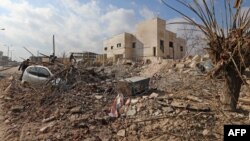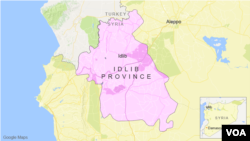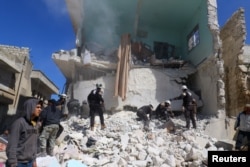Turkey is warning Damascus not to take action against the opposition-held region of Idlib in response to Syria's efforts against rebels in Daraa, where the Syrian government is attempting to control the last remaining opposition-controlled enclaves.
A senior adviser to Turkey's president, speaking to VOA on condition of anonymity, declared Ankara would not stand by if Damascus moved on Idlib. "Idlib is a red line for us. As you know, we have our forces deployed there," said the adviser.
Turkish forces have set up 12 military observation posts across Idlib province, which borders Turkey, as part of an agreement with Tehran and Moscow reached under the Astana peace negotiations.
'De-escalation" area
Idlib, like Daraa, is designated under the Astana process as a "de-escalation zone," where government forces and rebels observe a cease-fire. However, Damascus forces, supported by Russian airpower, have steadily overrun the rebel-controlled zones. "Yes, there are problems recognizing the de-escalation zones, We are seeing the de-escalation zones not being respected," said the Turkish presidential adviser.
Analysts warn any threat to Idlib by Syrian regime forces could pose a nightmare scenario for Ankara. "Turkey administers half of Idlib. That part of Idlib includes Idlib city, and there are 2 million people. The 12 [Turkish] observatory posts protect those jihadis and their families and those Sunni elements who will not make a deal with Damascus," said former senior Turkish diplomat Aydin Selcen, who served widely across the region.
"Of course, Turkey will be determined to avoid this enclave being overrun, as those people have nowhere to go but to Turkey. Moreover, Turkey will not want this to happen, as it would cause major security and humanitarian problems," Selcen added.
Experts warn any mass exodus from Idlib into Turkey would most likely include extreme radical groups linked to Islamic State and al-Qaida. Turkish security forces are already struggling to crack down on IS militants across the country.
Turkey currently hosts more than 3½ million Syrian refugees at a cost so far, according to Ankara, of more than $30 billion. Social tensions in Turkey are reportedly on the rise over the presence of large numbers of refugees, many of whom have been living in the country for years.
Opposition control
However, it's not only security and humanitarian factors that are behind Ankara's resolute stance over Idlib.
"It is not only because Idlib has over 2 million people and we cannot take any more [refugees]," said the Turkish presidential adviser. "It is important that the opposition has a region under its control so that the opposition is represented in Syria."
With the fall of Daraa, Idlib is one the last remaining regions under opposition control. Ankara has been a strong backer of the opposition since the start of the Syrian civil war and has invested heavily in its support.
Analysts point out the more extensive the region controlled by the opposition, the more leverage it has in final deliberations on the future of Syria. Equally, Ankara thinks a greater opposition presence strengthens its hand as well in its dealings with Moscow and Tehran. The three countries are continuing to cooperate over Syria, in what is an uneasy balancing act of competing agendas.
Complicating matters for Ankara in its efforts to protect Idlib is that it has no diplomatic relations with Damascus. Ties were severed at the onset of the Syrian civil war.
Direct talks
"The Syrian regime is also talking to Turkey indirectly, and probably it would be better to talk directly in the long run," international relations professor Huseyin Bagci of Ankara's Middle East Technical University said. "We shall see if the [Turkish] president changes his mind and starts his negotiations and talks directly with the regime, which is possible."
Damascus will most likely be aware of the leverage that the threat of an offensive on Idlib gives it over Ankara, given the danger posed to Turkey by a significant exodus of people that would be precipitated by an assault on Idlib.
While Ankara is insisting it will not stand by if Damascus forces action on Idlib, its room to act could be limited. "There will definitely be some problems [in Idlib], but without Russian support, Turkey can do nothing," Bagci said.
Moscow's support is vital because Russian missiles and warplanes control Syrian airspace. A Turkish military operation against Kurdish rebels in Syria's Afrin province in January was only possible, analysts say, because Moscow supported Turkish air power during the offensive.
















